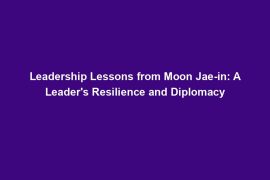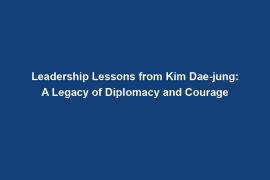Hey there, leadership enthusiasts! Today, we’re diving into the intriguing world of authoritarian leadership, with a focus on the enigmatic figure of Park Chung-hee. If you’re not familiar, Park Chung-hee was a South Korean president known for his iron-fisted rule and innovative economic policies.
Studying authoritarian leadership like Park Chung-hee’s can provide us with valuable insights into the dynamics of leadership. By examining his methods, we can uncover key lessons that can be applied to leadership scenarios today.
In this blog post, we’ll explore the authoritarian leadership traits of Park Chung-hee, such as his establishment of a centralized power structure, emphasis on discipline and loyalty, and use of coercion to maintain control. We’ll also delve into his economic policies that drove rapid industrialization and modernization, as well as his cultivation of a strong nationalist sentiment.
So, buckle up as we journey through the leadership lessons we can draw from Park Chung-hee’s authoritarian style. Get ready to learn about the importance of decisiveness, the balance between authority and empathy, the effectiveness of centralized power, the caution in utilizing authoritarian tactics, and the impact of charisma in leadership success.
Stay tuned for some eye-opening insights and practical takeaways that you can apply to your own leadership journey. Let’s unlock the secrets behind authoritarian leadership and empower ourselves to become better leaders in our own right!
Authoritarian Leadership Traits of Park Chung-hee
Now that we’ve set the stage and delved into who Park Chung-hee was, let’s take a closer look at the traits that defined his authoritarian leadership style. These characteristics not only shaped his governance but also offer valuable insights into understanding the dynamics of leadership. So, buckle up as we explore the key traits that made Park Chung-hee the leader he was!
Establishing a strong centralized power structure
Park Chung-hee believed in centralizing power to streamline decision-making and ensure efficient governance. By consolidating authority within his administration, he was able to implement policies swiftly and effectively. This centralized approach allowed him to push through his vision for economic development and modernization without bureaucratic hurdles slowing him down.
Emphasizing discipline, obedience, and loyalty from subordinates
Discipline was a cornerstone of Park Chung-hee’s leadership style. He instilled a culture of obedience and loyalty among his subordinates, demanding unwavering commitment to his vision. This strict adherence to hierarchy and discipline helped maintain order within his regime and ensured that his directives were carried out without question.
Utilizing coercion and fear to maintain control
While not the most palatable aspect of his leadership style, Park Chung-hee was not shy about using coercion and fear to maintain control. He employed tactics such as censorship, surveillance, and suppression of dissent to uphold his authority. This harsh approach, while effective in quelling opposition, also created an atmosphere of fear and repression.
Implementing economic policies for rapid industrialization and modernization
Park Chung-hee’s authoritarian tendencies were most prominently displayed in his economic policies. By implementing bold measures for rapid industrialization and modernization, he transformed South Korea from a war-torn nation into an economic powerhouse. His unyielding commitment to progress at all costs drove the country’s remarkable growth and development.
Cultivating a cult of personality and strong nationalist sentiment
Lastly, Park Chung-hee cultivated a cult of personality around himself, portraying himself as a visionary leader who could lead South Korea to greatness. He tapped into strong nationalist sentiments, rallying the population around a shared sense of pride and identity. This adulation and loyalty towards him further solidified his grip on power.
So, there you have it – the authoritarian leadership traits that defined Park Chung-hee’s rule. These characteristics, while controversial, offer valuable lessons on the complexities of leadership and the impact it can have on a nation. As we move on to the next section, we’ll explore the key leadership lessons that can be gleaned from studying Park Chung-hee’s leadership style.
Leadership Lessons from Park Chung-hee
Now that we’ve explored the authoritarian leadership traits exhibited by Park Chung-hee, let’s dive into the valuable lessons we can draw from his leadership style:
Importance of Decisiveness and Swift Action in Leadership
Park Chung-hee was known for his ability to make quick decisions and take decisive action. This trait allowed him to navigate complex challenges and drive progress in a rapidly changing world. As leaders, we can learn from his example and understand the significance of making timely decisions to propel our organizations forward.
Balancing Authority and Empathy in Leadership to Inspire Loyalty
While Park Chung-hee was authoritative in his leadership approach, he also understood the importance of empathy in building strong relationships with his subordinates. By striking a balance between authority and empathy, leaders can inspire loyalty and create a positive work environment where individuals feel valued and respected.
Effectiveness of Centralized Power in Driving Progress and Development
Park Chung-hee’s centralized power structure played a crucial role in driving rapid industrialization and modernization in South Korea. This highlights the effectiveness of centralized decision-making in promoting growth and development. However, it also underscores the need to maintain checks and balances to prevent abuse of power.
Need for Caution in Utilizing Authoritarian Tactics and Maintaining Checks and Balances
While authoritarian tactics can be effective in certain circumstances, it is essential for leaders to exercise caution and ensure that power is not abused. By implementing checks and balances within the organization, leaders can uphold accountability and prevent potential repercussions of authoritarian leadership.
Impact of Charisma and Image-Building in Leadership Success
Park Chung-hee’s charisma and ability to cultivate a cult of personality contributed significantly to his leadership success. This highlights the importance of building a strong personal brand and effectively communicating one’s vision to inspire others. By focusing on image-building and charisma, leaders can enhance their leadership impact and influence.
By reflecting on these key lessons from Park Chung-hee’s authoritarian leadership style, we can gain valuable insights into effective leadership strategies that can be applied in contemporary contexts. As leaders, let’s take the time to assess our own leadership styles and consider incorporating aspects of authoritarian leadership for greater effectiveness and impact.


